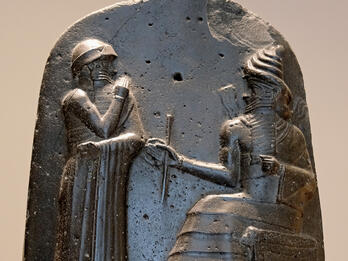Legal Materials from outside the Torah
The Hebrew Bible includes laws and references to laws in narrative contexts outside of the main legal collections of the Torah.
Legal matters are also referred to in the other parts of the Bible, in narratives and in poetic, prophetic, and wisdom writings. Some deal with studying, practicing, or enforcing laws from the Torah (Torah law in 2 Kings 14:6; 22–23; Ezra 7, 10; Nehemiah 8–10, 13; 2 Chronicles 17:9). In 1 Samuel 30:21–25, there is a law promulgated by a king, the only such case in the Bible. In some cases, the practice differs from the laws in the Torah; for example, the accounts of the levirate marriages in Genesis 38 and Ruth 4 diverge from the law of Deuteronomy 25. These inconsistencies may have arisen because legal practice changed over time or from place to place, or because the law had been reinterpreted, or because later authors wished to invoke Torah wording for their own purposes, even if that required taking liberties with actual legal practice. Other passages speak of the enactment of new laws in the postexilic period, among them laws for the support of the Temple (Nehemiah 10) and the establishment of the festival of Purim (Esther 9). The prophet Ezekiel envisions a new set of laws when the Temple is rebuilt, regarding the construction of the Temple, its practices and procedures, and the distribution of inherited property (Ezekiel 40–48).
Some biblical narratives describe contracts, verbal contracts in the case of Abraham’s purchase of a burial cave (Genesis 23) and the story of Ruth’s levirate marriage (Ruth 4), and a written contract by which the prophet Jeremiah purchased a field (Jeremiah 32). Finally, we have extrabiblical documents referring to legal matters. In an inscription from Metsad Hashaviahu, a short distance north of Ashdod, the writer complains to an official about mistreatment by a superior. Most extrabiblical Israelite and Jewish legal documents come from communities living under foreign rule in the Persian period—papyrus documents written in Samaria (the capital of the former Northern Kingdom) and Egypt that were found in arid locations where the dry climate protected them from complete disintegration, and clay tablets from Assyria and Babylonia. In these documents, Jews are involved in legal transactions that follow local non-Jewish practices rather than practices detailed in the Bible.


